Ensign Spock's first day aboard the USS Enterprise doesn't go as planned when he and Number One are unexpectedly stuck together in a turbolift.
Summary[]
In 2253, Ensign Spock, a Vulcan, beams aboard the USS Enterprise from Starbase 40 to report for duty. Materializing in the Enterprise's transporter room with a small, momentary smile on his face, he is met by Una Chin-Riley, the ship's first officer. Spock announces himself loudly before being asked by Chin-Riley about his voyage to Starbase 40, which he describes as uneventful. Chin-Riley reminds him that there is no need to yell and admonishes him for not having asked a single question in the thirty-seven seconds he has been onboard, giving him until she reaches the turbolift to start.
Spock begins by asking Chin-Riley for her name, to which she replies "Just call me Number One." He then asks for her opinion of the Onafuwa model of combat salvo analysis compared to the traditional Neo-Wayne model, learning that she considers it "problematic". As two enter the turbolift, Number One asks Spock how he would like to see the bridge before setting it as their destination.
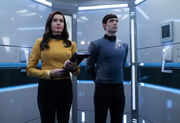
Number One and Spock in the turbolift
Number One comments that Spock had been in Onafuwa's Fundamentals of Quantum Stochastics class, advanced one and two, and seminar, and that he had received top marks. Spock agrees with Number One's assessment of the classes as "brutal." She continues, describing Onafuwa as a "brilliant monster" and the subject matter as "fascinating."
Suddenly, the turbolift suffers a computer error and the two officers are trapped inside. Number One contacts engineering and alerts Upjohn of the failure. As they wait for the malfunction to be corrected, Spock heeds Number Ones advice and continues asking her questions to the point of annoyance. Spock first asks for "the three most salient facts about Captain Pike," the captain of the Enterprise. Number One describes Pike's openness to other points of view and his belief that resorting to force is an admission of failure, concluding by calling him "utterly unsentimental . . . except when it comes to horses."
Spock continues asking questions, inquiring about Enterprise's operating system, its food synthesizers, Number One's views on the Prime Directive, and her opinion of eggplant. Eventually, becoming tired of waiting, Number One has Spock hoist her up so she can open the service hatch and try to fix the problem. As Upjohn gives her directions, she has Spock continue asking questions. Suddenly, the technology behind the service hatch emirates an electric shock, knocking Number One to the floor. After making sure Number One is unhurt, Upjohn informs them that Lieutenant Amin will repel down the turboshaft to get them out of there, but that it will take a little more time.
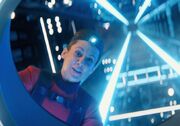
"Folks ready to go?"
Number One asks Spock if he has any more questions. He apologizes, saying that he has none. She then asks him if he was smiling when he beamed aboard the Enterprise, as she did not know that Vulcans smiled. Spock says that he will avoid smiling in the future, but Number One rejects this, saying that "The strength of a Starfleet crew is in its diversity and differences." She continues, saying that, despite this, one must be aware of how they are perceived by their comrades. She explains that this is the advice she would give to any officer whose goal it is to attain command. Spock, however, claims that command is not his goal. Number One is skeptical, saying that, "No one endures two solid years of Onafuwa on quantum-stochastic combat modeling because they want to sling a tricorder for the rest of their lives." She then says that, if you want to command, you must "keep your freaky to yourself, even if that's painful." Spock tells her that he has been doing that his whole life, and that it is painful. Number One tells him that she knows it is, which "leads to a logical next question." Number One responds to this by revealing her own "freaky" by singing Gilbert and Sullivan's "I Am the Very Model of a Modern Major-General". After a moment's pause, Spock joins in for chorus, concluding with them both bursting into laughter. Just then, Number One hears Lieutenant Amin descending and orders Spock swear on his honor as a Starfleet officer to forget what just happened, to which he swears. They are then rescued by Lieutenant Amin.
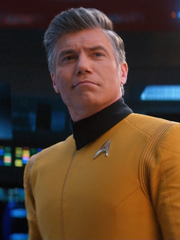
"Do Vulcans ever feel awe, Spock?"
Finally, Number One and Spock reach the bridge. Captain Pike asks Number One if Spock is the "new boot," prompting Number One to look up Spock's name on a list to tell it to Pike. Pike tells Spock to be at ease, to which Spock replies that it is not one of his strong suits. Pike says he understands. As they look out of the viewscreen and observe a stellar phenomenon, Pike asks Spock if Vulcans ever experience awe. Spock informs him that they do, but that they tend to keep it to themselves.
Memorable quotes[]
"Sir, Ensign Spock, S 179-276 SP, reporting for duty."
- - Spock to Una Chin-Riley, after being transported to the Enterprise
"What are the three most salient facts about Captain Pike?"
"One, his capacity for hearing out another point of view is exceeded only by his willingness to change his own once he's heard you out. Two, even though he is the most heavily decorated fighting captain in Starfleet, he views resorting to force as an admission of failure. And three... he is utterly unsentimental except when it comes to horses."
- - Spock and Una Chin-Riley, on Captain Pike
Background information[]
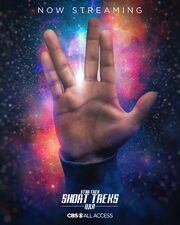
Promotional poster for the episode released after the premiere
- This episode was released on Saturday, 5 October 2019, in conjunction with a Star Trek panel at the New York Comic-Con.
- This is the first episode or film in the Star Trek franchise to premiere on a Saturday since Star Trek: The Animated Series' "The Counter-Clock Incident", 45 years earlier.
- This is the first Star Trek episode or film to debut without the premiere date having been announced ahead of time.
Writing[]
- Michael Chabon wrote this episode to provide an in-universe explanation of why Spock's behavior and manner in "The Cage" are so different from those seen in the rest of TOS.
- "It's something I've mulled over and thought about since the very first time I saw "The Menagerie" when I was like 10 years old. And of course there was a Doylist explanation for why Spock is so, so different. But, the one thing that just can't be explained is from a Watsonian point-of-view was that; like what is with Spock? It's that smile. More than anything. Yeah, there's the shouty-ness and lots of other expressions of emotion that are sort of disturbing if you feel like you know the character of Spock. In the extra-fictional sense, Spock took over Number One's personality. And if we're going to really plunge into them and they're going to be co-existing with each other, we need to account for that."
- Chabon described this episode as "patching the hole" of "the mystery of Spock's smile, when he encounters the singing flower on Talos IV." Chabon wrote that in "The Menagerie", "apart from the ears and the gull-wing eyebrows, the Spock who served under Captain Pike was nothing like the Spock who later launched a thousand zines."
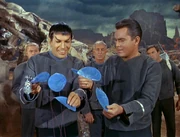
Spock's smile, when he encounters the singing flower on Talos IV
- "In the rejected pilot, and in Roddenberry's original conception of the show, Number One was the expressionless, rational, cool-tempered crew member, "almost glacier-like," according to the episode's teleplay, "in her imperturbability and precision" (glaciers evidently having become more precise by the twenty-third century). Spock, by contrast, was decidedly warmer, his animated face and voice freely expressing such emotions as alarm, concern, relief, and even an almost childlike delight, when, having beamed down to the surface of the planet Talos IV, he encountered that singing flower and broke out, in a way that never got less disturbing, no matter how many times one saw it, in a toothy grin. The pretext for my script, the hole in the quilt, was the lack of any "in-universe" – or "Watsonian," as opposed to "out-of-universe," or "Doylist" – explanation for Spock's transition from expressive, even unreserved, to thoroughly glacial."
- During the writing of this episode, Alex Kurtzman texted Rebecca Romijn and asked her whether she had any special skills. She replied that she played badminton, was good with foreign languages, and sang Gilbert and Sullivan. Because of the last, Michael Chabon decided that Una Chin-Riley's "freaky" would be a fondness for Gilbert and Sullivan, and wrote the scene in which she sings "I Am the Very Model of a Modern Major-General". ("Inside Short Treks: How Rebecca Romijn Helped Sneak Gilbert and Sullivan into Star Trek" at CBS All Access; "Michael Chabon Explains His New Short Trek's Connections to The Next Generation and Picard" at SyFy Wire)
- When Chabon pitched this Short Trek episode, he also pitched, as a bookend, a Short Trek about Number One's last day on the Enterprise. ("Michael Chabon Explains His New Short Trek's Connections to The Next Generation and Picard" at SyFy Wire)
Production[]
- This episode appears to have initially been called "Chaos Theory". That title was announced in an Instagram post by director Mark Pellington in late May 2019. Another post by Pellington contained images of the director with actors Rebecca Romijn and Ethan Peck, and the hashtag #Chabon, suggesting the episode was written by Michael Chabon. [1] The title "Q&A" was first mentioned in passing in the press release announcing that Michael Chabon had been named the showrunner for Star Trek: Picard. [2] On 20 July 2019, Alex Kurtzman confirmed that there would be six episodes in the second season of Short Treks. The same day, a trailer for the season was released, including six episode titles; "Chaos Theory" was not among those names. [3] This episode was written by Michael Chabon and was mainly focused on Una Chin-Riley and Spock, the characters played by Romijn and Peck, respectively, leading to the idea that "Q&A" is likely a new name for what had previously been referred to as "Chaos Theory".
- The episode is dedicated in memory of Dr. Robert Chabon, father of Michael Chabon. As Chabon recounted in an essay in The New Yorker, he wrote part of "Q&A" in his father's hospital room as he lay dying. [4]
Cast and characters[]
- Samora Smallwood (Amin) first appeared in the DIS Season 2 episodes, "Such Sweet Sorrow" and "Such Sweet Sorrow, Part 2". The Enterprise War had established that Amin had joined the Enterprise crew at some point before the events of the book in 2256, which is consistent with her being aboard in this episode which is set in 2253.
- In this episode, Jenette Goldstein took over as the Enterprise's computer. The role was held by Majel Barrett-Roddenberry from 1966 until her death in 2008. Goldstein previously portrayed the science officer aboard the USS Enterprise-B in Star Trek Generations.
Music and sound[]
- Michael Giacchino served as a supervising composer on this episode, and some themes reminiscent of the alternate reality films can be heard in the short.
- Israeli/Dutch composer Nami Melumad composed music for this episode, including the end titles cue. This is the first episode in the franchise to be scored by a female composer. [5]
Continuity[]
- This episode takes place before the events of "The Cage", which is set in 2254.
- The crew already wear what were described as "the new uniforms" in "Brother", set in 2257.
- Spock's observation that Una Chin-Riley has "made a most careful study" of Capt. Pike, and Number One's subsequent reaction to that comment, foreshadow the revelation in "The Cage" that she is attracted to Pike.
- After beaming aboard, Spock stated his serial number "S 179-276 SP", which was also stated in "Court Martial". At this time, Spock also announces to Number One that he is "reporting for duty" in a similarly loud, enunciated intonation to the one used by Leonard Nimoy in his original performance as Spock in "The Cage."
- When conversing about the nature of General Order 1 with Number One during this episode, Spock refers to it as the "Prime Directive." In "Strange New Worlds", which takes place several years later in 2259, Admiral Robert April describes that the Federation Council had only just ascribed that moniker to the directive in the wake of the Enterprise's incident response on the surface of Kiley 279.
- There are a number of similarities between this episode and the Star Trek: The Next Generation episode "Disaster". In addition to having characters stuck in a turbolift and having to exit through the turboshaft, both episodes feature a character singing "I Am the Very Model of a Modern Major-General", then being embarrassed by it. Writer Michael Chabon acknowledged the similarities, but said that they were inadvertent:
- "I know that episode ["Disaster"]. I remember that episode. But it really was an accident. I think in the back of my mind, the idea of Picard getting trapped in the turbolift was certainly there. I've seen it at least twice, maybe more over the years.
[Having Number One sing Gilbert and Sullivan] arose because it's in Rebecca Romijn's resume! I didn't know that. I inquired. I was already thinking of Number One and her quote-unquote 'freaky.' So I asked her if there was anything that Rebecca might be capable of that I didn't know, that the public didn't know, that maybe nobody knew, and that's one of the first things said she was a trained Gilbert and Sullivan singer. And I said 'that's perfect.'
Now, the fact that 'that's perfect' was my response is because I had this unconscious memory of the Gilbert and Sullivan from that episode. But it was not the first thing I thought of. The first thing I thought of was I can instantly see this cool, reserved woman who doesn't ever show anyone anything just suddenly busting out in this incredible patter song. It seemed immediately perfect and immediately true to me of Number One. So then, to have it all come together and kind of resonate as an homage to that episode of TNG, it was both accidental I think, but also, deep down, I'm a huge fan of TNG. Having that stuff in there. It's all in there somewhere."
Links and references[]
Starring[]
Co-starring[]
References[]
99 Pegasi; animal; animalculous; binomial theorem; belaying rig; boson sampling; bullshit; combat salvo analysis; Delta Scuti star; differential calculus; diode; e; eggplant; England; Enterprise, USS; fan; first officer; food synthesizer; golden ratio; Gupta glucose matrix; helmsman; horse; hypotenuse; "I Am the Very Model of a Modern Major-General"; integral; Katzman glucose matrix; king; Ling plateau; Major-General; Marathon, Battle of; mathematical constant; memorandum; microbox; mineral; Neo-Wayne model; news; Onafuwa; Onafuwa model; Prime Directive; quadratical equation; quantum stochastics; quantum-stochastic combat modeling; rock climbing; science officer; OS; service hatch; smile; Starbase 40; square; tricorder; turbolift; Una glucose matrix; vegetable; Vulcan; Waterloo, Battle of
External links[]
- "Q&A" at the Internet Movie Database
- "Q&A" at Memory Beta, the wiki for licensed Star Trek works
- ""The One with Two Short Treks"" at MissionLogPodcast.com
Previous episode:
|
Next episode:
|
Warning: Default sort key "Q&A" overrides earlier default sort key "Q&A (episode)".

